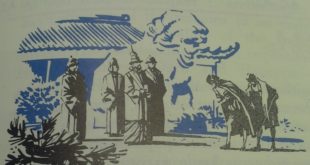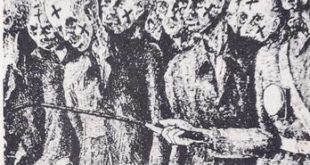In the same way that important ancient civilizations grew out of small beginnings in the valleys of the Nile, the Tigris-Euphrates and the Indus, so another great civilization of Early times — that of China — was cradled in the valley of the Yellow River. To be sure, China’s civilization did not commence as early as did Egypt’s, Mesopotamia’s, or India’s. The ancient Egyptian and the Mesopotamian kingdoms lost their power many centuries ago and early India never became completely united under one empire. China therefore has had a longer national life than any other ancient or modern state. It …
Read More »Tag Archives: Japan
The Thaw in the Cold War 1953-1959
Stalin had left behind him a world of suspicion, distrust and fear. Suspicion, distrust and fear were as great in his own country as anywhere else, for he had ruled as a dictator and had never set up a definite procedure for transferring power to another leader. Immediately after his death, a five-man presidium, or council, took over the rule of the Soviet Union. The presidium chose Georgi Malenkov, who had been Stalin’s right-hand man, as the new premier, but a number of factions were struggling for control of the government and one of them was led by Lavrenti Beria, …
Read More »War in Korea 1945-1953
Although the cold war was the most important fact in the politics of the post-war world, few persons could have foreseen that it would lead to fighting in the small, remote country of Korea. Yet, as small and remote as it was, Korea had a strategic location. It was near three large powers — Russia, China and Japan — and the Japanese said it “points like a dagger at the heart of our country.” The Japanese won control of Korea in the Russo-Japanese War and by 1905 they ruled it as part of their empire. During World War II, the …
Read More »“My Name Will Stand Forever” 1933 – 1938
Adolf Hitler, stood above the German town of Berchtesgaden, in a large, imposing house in the mountains and stared out a window. It was a fine February day in the winter of 1938 and the snow-covered peaks of the Alps glistened in the clear air. The man at the window seemed not to see the peaceful mountains. Berchtesgaden was close to the border of Austria and he seemed to see beyond the mountains into the heart of Austria itself — an Austria filled with marching troops‚ cheering crowds and the swastika banners of the Nazis. Staring at this vision, he …
Read More »The Meaning of Totalitarianism
So it happened that in many parts of the world people were living under a system of government that came to be called totalitarianism. There were differences in the governments of the totalitarian countries, but they were alike in certain important ways. In each of them, the government was controlled by one political party, usually under a dictator and no other political parties were allowed. The ruling party was not satisfied to control the government; its aim was total control of the life of its people. It controlled the courts and the armed forces, labour and industry, science and the …
Read More »The Powers Carve Up China 1841 – 1914
China, that immense portion of East Asia bounded by the chilly Amur River and the hot jungles of Indo-China, by the Pacific Ocean and the Himalaya Mountains, was the most populous country on earth. For thousands of years, China had had a highly developed civilization. Its people thought of their land as the world itself; to them, it was the Middle Kingdom between the upper region, heaven and the lower region, hell, which was made up of all other lands. They considered foreigners nothing but barbarians. Only a few Europeans had entered China since the Middle Ages and the Chinese …
Read More »The Race for Empire 1870-1914
While the peoples of the West were concerned with the problems that grew out of industrialization, their governments were taking part in one of the greatest land grabs in history. By the end of the nineteenth century they had brought within their grasp most of the earth’s land surface and half its inhabitants. This development created new empires and enlarged old ones, it was called imperialism. Imperialism came about in many ways, from armed invasions to polite talks that led native rulers to place their countries under the protection of an imperialist power. It took many forms, from colonies which …
Read More »Prince Henry’s School 1415 – 1499
IN 1415, WHEN ALL OF CHRISTENDOM belonged to one church and Christians battled pagan Turks instead of one another, a force of Portuguese marines set sail for the coast of Africa. They planned to attack a town called Ceuta. A stronghold that guarded the narrow passage connecting the Mediterranean Sea with the Atlantic, Ceuta was the end link in the chain of fortresses and well-armed ports that the Turks had tightened around the southern and eastern boundaries of Europe. Held in by this chain, European merchants could not trade in the luxury-filled markets of the east, pilgrims could not journey …
Read More »The Warrior’s Take Over A. D. 1150 – 1336
BY THE middle of the twelfth century, Kyoto was no longer the real center of power in Japan. The old forms of government were kept unchanged. The emperor was still, supposedly, the source of all authority. The aristocrats wanted to enjoy the excitement of the Fujiwara court and they left their poorer relatives at home to manage their estates. The young men who were given this responsibility did not mind. Indeed, they welcomed it, for it was their only chance to get rich. So the Japanese aristocracy was divided between great nobles at the court and lesser nobles in the …
Read More »Japan’s Change and Slow Growth A.D. 838-1150
BETWEEN THE ninth and twelfth centuries, Japan developed at a slower pace. It was as if the people knew that they needed time to digest what they had learned. After 838, the government sent no more official missions to China. The Japanese continued to value Chinese civilization as highly as ever, but they went about things in their own way. Slowly, Japan became thoroughly Japanese. Prince Shotoku’s dream of a strong central government had come true. In time, however, the same evils that plagued Chinese dynasties in their later stages began to plague Japan. Thanks to their high positions at …
Read More »








